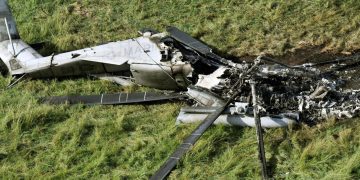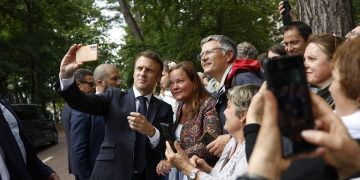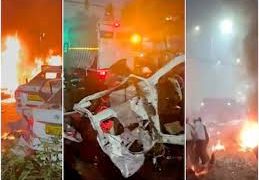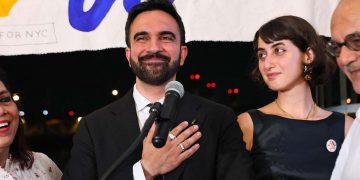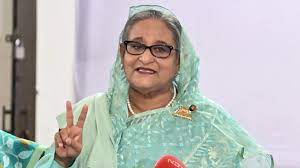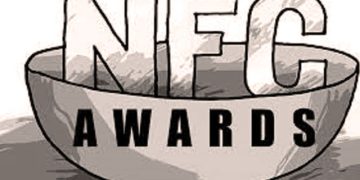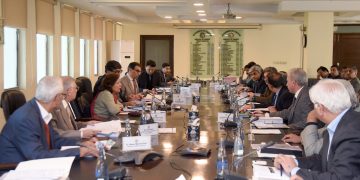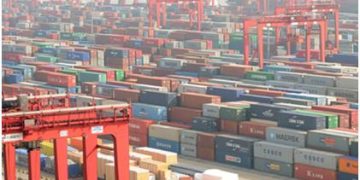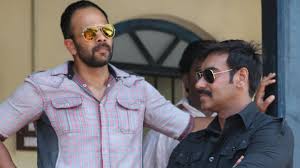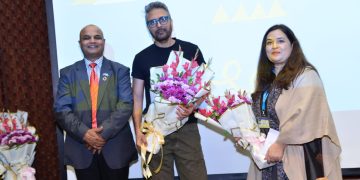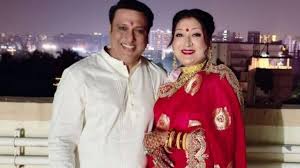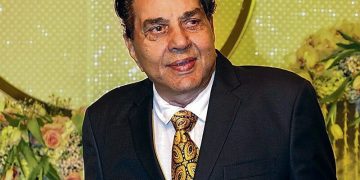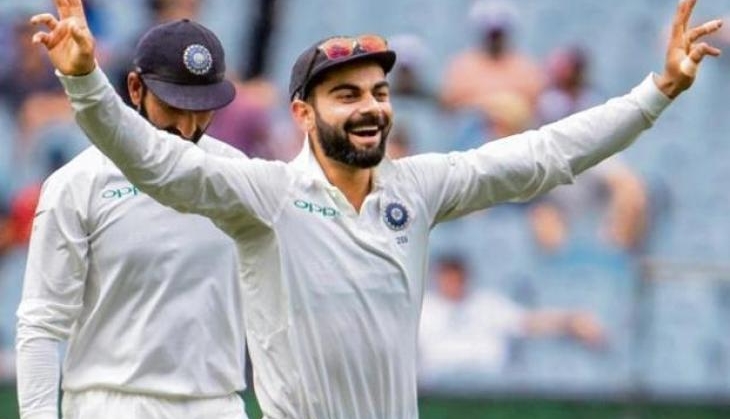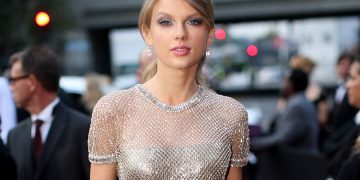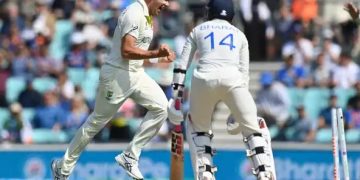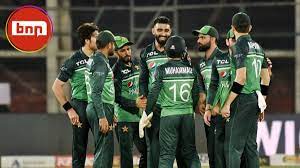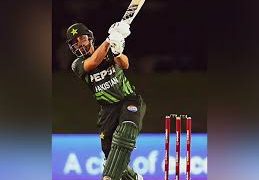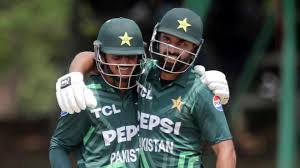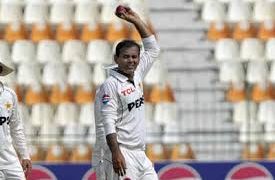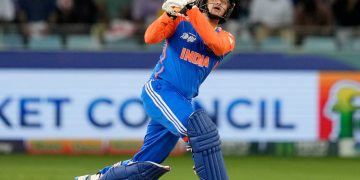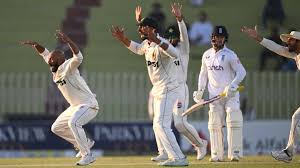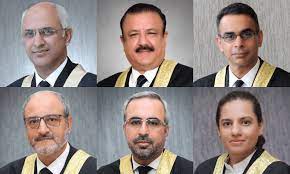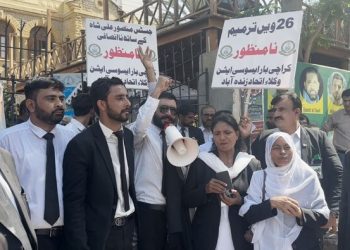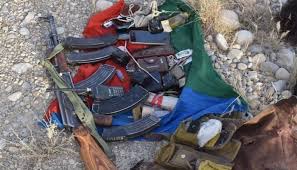The 10th Adab Festival opened at Habitt City with a vibrant showcase of literature, cultural expression, and artistic heritage, drawing writers, thinkers, students, and book lovers from across the city for a day of stimulating sessions and performances.
The Festival commenced with an official inauguration ceremony presided over by Zehra Nigah, with Pomme Amina Gohar as MC. Guests were welcomed with the National Anthem performed by students of Roots Millennium School, followed by opening remarks from Adab Fest Founder and Director Ameena Saiyid OBE, Sitara e Imtiaz, Chevalier de l’Ordre des Arts et des Lettres, and Munis Abdullah, CEO of IBL Group and venue partner.
The ceremony included the announcement of the 2025 Infaq Foundation–Adab Festival Literary Awards in Sindhi, Urdu, and English, celebrating outstanding literary contributions from across Pakistan. This was followed by insightful speeches by Kishwar Naheed, Dr Ishrat Husain, and Shandana Minhas.
A moving segment titled ‘Tum Yaad Aaye: In Memoriam (2020–2025)’ honoured the late distinguished Pakistani intellectuals and artists Arfa Sayeda Zehra, Nuzhat Kidvai, Zubeida Mustafa, Aamer Aziz Saiyid, Khaled Ahmed, Talat Husain, Qavi, Zia Mohyeddin, Shoaib and Humair Hashmi, Amjad Islam Amjad, Shakeel, Imran Aslam, Nayyara Noor, Imdad Husseini, Sayeed Hasan Khan, Sheherezade Alam, Haseena Moin, Nyla Jaffri, Suhail Lari, I. A. Rehman, Yasmeen Tahir, Bapsi Sidhwa, Fauzia Salman, Haniya Aslam, Karamat Ali, Babar Ayaz, Sultan Arshad Khan, Khalid Saeed Butt, Roshanara Bokhari, Huria Younas Khan, Pappu Sain, Anwar Iqbal, Farhad Humayun, Farooq Qaiser, Ustad Mubarak Ali Khan, Muhammad Ali Sadpara, Irfan Husain, and Asif Farrukhi, who passed away in this period, with a song by Shayma Saiyid, who performed Nayyara Noor’s rendition of Nasir Kazmi’s poetry, accompanied by Samreen Harrison on cello/violin. This was followed by Bol Keh Lub Aazaad Hain Tere’ by Usama Israr Ahmed, who presented Tina Sani’s celebrated rendition of Faiz, both composed by Arshad Mahmud.
The day unfolded a range of thought-provoking simultaneous sessions covering subjects ranging from Urdu literature, progressive politics, and cultural heritage to art, history, and education.
For children especially, there was a lot on offer this time round, through the day. From a Book & Craft Fair, to a bustling Children’s Literature Strand featuring a talent show, storytelling by Yasmin Motasim, puppet theatre by Mehreen Kamran, bookmaking sessions with Ameena Saiyid, and theatre activities led by Atif Badar, there was something for all ages and tastes. A dedicated Creative Writing Workshop entitled ‘The Storymakers Studio’ for teenagers, conducted by Taha Kehar was also very popular.
The first discussion session of the day featured Zehra Nigah in conversation with Shoaib Arshad in an evocative session titled ‘Jo Sun Sako To Yeh Sab Daastaan Tumhari Hai: Adab Ke Badalte Chehre Aur Hum’, exploring the evolution of Urdu literature and its reflection of societal change. Simultaneously, a gripping book talk on ‘Zahid Hussain’s A Dialogue with History and Face to Face with Benazir’, took place where Dr Omair Ahmed Khan and Dr Nafisa Shah joined the author for an insightful conversation on Pakistan’s political landscape. The next session of the day focused on ‘The Evolution and Decline of Progressive Literature and Politics in Pakistan’, a thought-provoking exchange featuring Dr Naazir Mehmood and Dr Syed Jaffar Ahmed.
A popular session was a critical discussion on ‘Connecting Art, the City and its People’ featuring Noor Ahmed, Amin Gulgee, and Bushra Hussain, moderated by Syed Hasnain Nawab. It highlighted the role of art in shaping urban consciousness. It was followed by a screening of five impressive documentaries by students of different schools who had participated in a film-making workshop organised by Karachi Biennale.
Simultaneously, a parallel panel explored ‘The Cultural Relationship of Sindh with the River and the Sea’, with Saif Samejo, Naseer Memon, and Zubaida Bhirwani, moderated by Noor-ul-Huda Shah, offering a deep dive into Sindh’s identity shaped by its landscapes.
The Festival continued with multiple book-focused conversations: A warm book launch for Amber Zaffar Khan’s ‘My Friend Maya’ featured the author in discussion with Khurram Koraishy. This was followed by a book talk on Shabbar Zaidi’s ‘32 Onkar Road’ which featured Salim Raza in conversation with the author, unpacking Pakistan’s political and economic complexities. Simultaneously, a compelling Book Talk session on Syed Muhammad Taqi’s ‘The Future of Civilization’, translated into English by Sumera Naqvi, brought Zafar Masud and Kazim Saeed together for an engaging dialogue moderated by Lubna Jerar Naqvi.
Later in the day, audiences gathered for ‘Heer: The Woman of Today. Celebrating Waris Shah’s Masterpiece’ by Sarwat Mohiuddin, accompanied by a soulful performance by Usama Israr Ahmed. Simultaneously, the book launch of Zubeida Mustafa’s ‘Chatting with Daadi’ featured dramatic readings by Asma Mundrawala and Shama Askari, followed by a discussion with Shama Askari, Ameena Saiyid, Baela Raza Jamil, and Rumana Husain, moderated by Shazia Hasan.
The lineup also included the book launch of Shama Askari’s English translation from Urdu of the Pashto original by Hayat Roghaani: ‘Queen Zarqa: A Transgender’s Odyssey’, with panelists Nisha and Naila Mahmood, moderated by Hoori Noorani.
While this session was taking place, a book launch of Farhatullah Babar’s ‘Beyond The Bomb: Munir Ahmed and Pakistan’s Nuclear Odyssey’ also took place, featuring Mazhar Abbas, Ameena Saiyid, and Azaz Syed with the author, moderated by Omayr Aziz Saiyid. The session ended with a beautiful song, “Watan Ki Mitti Gavaah Rehna,” sung by the talented Aiyra.
The evening sessions offered stimulating reflections on the future of communication and learning. A notable discussion titled ‘Truth, Trust and Tenacity: The New Media Paradigm’ sponsored by Faysal Bank, brought together leading journalists Fazil Jamili, Amber Rahim Shamsi, Azhar Abbas, and Azaz Syed, moderated by Nadia Naqi, addressing the challenges facing public trust in digital media. Simultaneously, a thought-provoking session titled ‘Becoming The Masters Of Our Own Destiny: Why Pakistan Must Stop Outsourcing Its Future’ featuring Syed Naved Husain, a distinguished Canadian entrepreneur, and introduced by Raheela Baqai, was held.
Immediately after, experts in school education, Dr Fauzia Khan, Dr Naveed Yousuf, Salma Alam, and M. Hassan Khan, discussed ‘The Future of Learning, Tech & Teaching: School Education’, moderated by Dr Anjum Halai. On the same subject, another session followed, this time with experts in higher education, Dr Muhammad Ali Shaikh, Talib Karim, Dr Anjum Halai, and Dr Huma Baqai in conversation, moderated by Dr Syed Jaffar Ahmed, analyzing the evolving landscape of academia in Pakistan. Both sessions were sponsored by Faysal Bank.
A multilingual ‘Mushairah: Pakistan Ki Zubaanain’ featuring Sadia Lashari (Siraiki), Ishaq Khamosh (Balochi), Masroor Pirzado (Sindhi), Shoukat Kamal Cheema (Punjabi), Sarwar Shamal (Pashto), Ali Ahmed Jan (Burushaski), Qamar Kazmi (Balti) and moderated by Waheed Noor, drew a large and appreciative audience.
The day concluded with Usman Israr Ahmed’s ‘Tribute in Tarannum to Tina Sani & Nayyara Noor & the Great Poetry they have sung’. Simultaneously, a mushairah was presided over by Zehra Nigah, attended by chief guests Dr Pirzada Qasim, Raza Siddiqui, and Anwar Shaoor. Nizamat was by Nasira Zuberi, and distinguished poets including Afzal Ahmed Syed, Tanveer Anjum, Khalid Moeen, Kashif Hussain Ghayar, Waheed Noor, Fazil Jamili, Inaam Nadeem, Kashif Raza, Wajih Sani, Dr Mana, Dr Najeeba Arif, and Kishwar Naheed participated.
Co-founded by Ameena Saiyid and the late Asif Farrukhi, the 10th Adab Festival Pakistan celebrated its tenth literary engagement, continuing its mission to foster dialogue, creativity, and cultural understanding. The Festival will proceed with Day 2 programming on Sunday, 23rd November, 2025 at the Habitt City in Karachi.
10th Adab Festival kicks off with riveting sessions
Get real time update about this post categories directly on your device, subscribe now.

